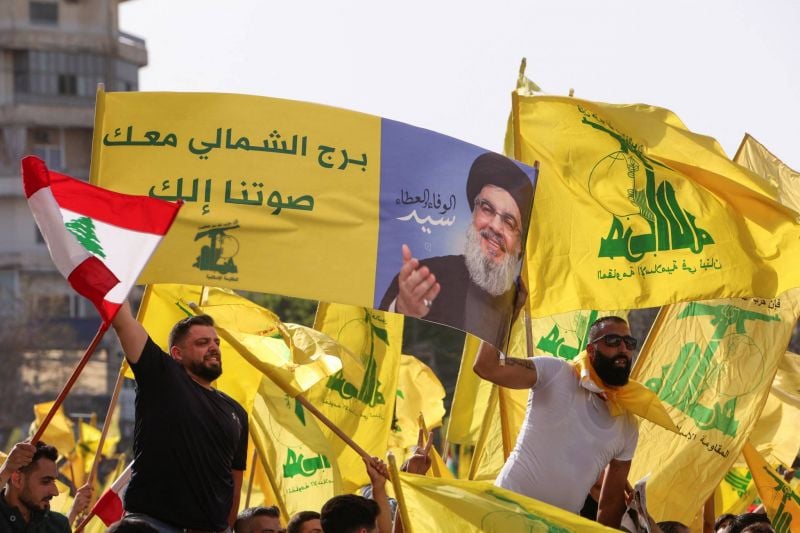
Supporters of Hezbollah and its leader Hassan Nasrallah hold flags during an election rally in Sour, Lebanon, on May 9, 2022. (Credit: Aziz Taher/Reuters)
Want to get the Morning Brief by email? Click here to sign up.
President Michel Aoun said yesterday that the diaspora vote will “not cause major changes in the results” of the parliamentary elections, and that the May 15 domestic vote will only bring “minor changes.” In an interview with Al Joumhouria, Aoun said that he plans to leave office at the end of his term, even in absence of a successor. Despite his comments, he noted that he was pleased with the overseas elections taking place. Lebanese living abroad voted in 58 countries last Friday and Sunday. In case a successor is not in place at the end of Aoun’s term, then the cabinet will assume the powers of the president until one emerges. If no government is formed after the parliamentary elections, then “the current government, which will be responsible for managing current affairs, will manage things, even if its prerogatives are limited,” the president said. Aoun did not express who he preferred to succeed him, but did mention that his son-in-law Gebran Bassil’s “succession to the presidency under these conditions would be a difficult and delicate mission.”
In his second speech in as many days, Hezbollah chief Hassan Nasrallah said his party “would be [a] frontliner in removing the Lebanese sectarian system.” His speech directly followed one given by Parliament Speaker Nabih Berri at an election rally in the southern suburbs of Beirut. Nasrallah stated that his supporters’ presence sends a sign that they “are loyal to the resistance” despite what he claimed were American attempts “to make them revolt against the party amid the economic crisis.” On the topic of banking losses, Nasrallah said that depositors should not bear their brunt, especially as banks made “very high profits from the interest rates in return” when lending money to the government. Since October 2019, banks have imposed de facto capital controls on deposits in US dollar bank accounts, while reportedly allowing billions of dollars to be transferred abroad. Ironically, Hezbollah and Amal’s joint list in the South III district includes Marwan Kheireddine, a former minister and the current head of Al-Mawarid Bank.
In a separate televised address, Parliament Speaker Nabih Berri yesterday intensified his political rhetoric just days away from the elections on May 15. In his second speech of the day, Berri called on his supporters to “vote intensely to support the resistance,” describing this cycle as “the most dangerous in the history of Lebanon.” Berri also called out opponents for “playing the sectarian card,” describing it as treason. He also accused rivals across the political spectrum as well as “ones that are affiliated with the embassies” of unfairly targeting Amal and Hezbollah, as well as the latter’s weapons. He added that alternatives to non-renewable energy are a priority for Amal’s MPs and ministers “in the coming period.” Berri has been Parliament speaker since 1992.
Human Rights Watch has called on Lebanese authorities to ensure equal access to polling sites in the upcoming elections, especially for people with disabilities and the elderly. In a statement, the NGO expressed doubts that people with disabilities could cast their ballots safely. It noted the shortcomings of the Interior Ministry during the 2018 elections in providing access to people with disabilities. During those elections, the ministry had assigned police and Civil Defense members to carry disabled persons to high floors in polling stations. Sylvana Lakkis, president of the Lebanese Union for People with Physical Disabilities told HRW that when doing this, some political groups tried to take advantage of the situation to influence voters. The statement noted that around 10 to 15 percent of the Lebanese population has a disability, and that Lebanon has the oldest population in the Middle East, and also expressed concern over whether anything was being done to help those with intellectual, visual or hearing disabilities to make informed choices at the ballot. Although Lakkis noted some progress in terms of accessibility to some polling stations, she said this is not seen on a country-wide scale. The statement yesterday came as Interior Minister Bassam Mawlawi announced a ban on motorcycles on election day, a form of transportation used by many as the cost of fuel continues to rise.
In case you missed it, here’s our must-read story from yesterday: “Mapping Lebanon's towns and neighborhoods shows diaspora registration clusters”